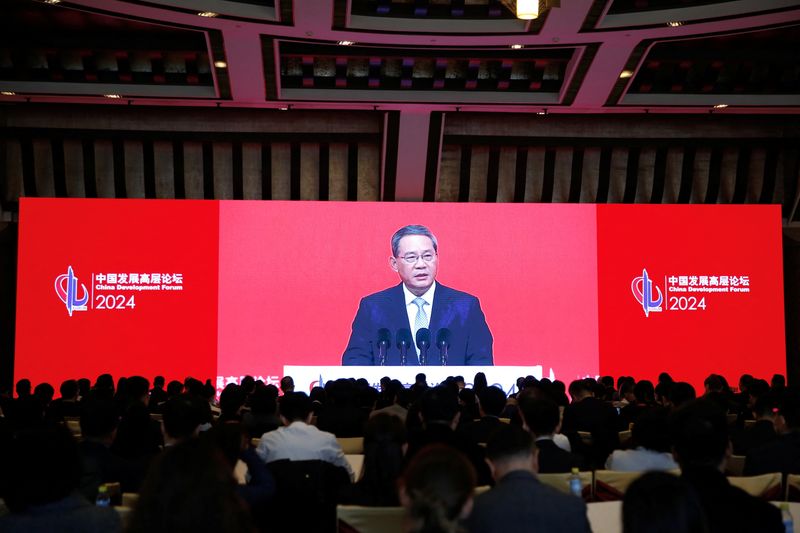
© Reuters. Journalists watch a giant screen showing live-streaming footage of Chinese Premier Li Qiang delivering a speech at the opening ceremony of China Development Forum (CDF) 2024, in Beijing, China March 24, 2024. REUTERS/Jing Xu
2/4
By Colleen Howe and Jing Xu
BEIJING (Reuters) – China needs to “reinvent itself” with economic policies to speed resolution of its property market crisis and boost domestic consumption and productivity, the International Monetary Fund’s Managing Director Kristalina Georgieva said on Sunday.
“China faces a fork in the road — rely on the policies that have worked in the past, or reinvent itself for a new era of high-quality growth,” Georgieva said in remarks to a meeting of senior Chinese government officials and executives from global companies.
Chinese officials who spoke at the opening of the China Development Forum expressed confidence that China would hit its economic targets, including growth of about 5% this year, and pledged further support for companies in strategically important sectors, an area Chinese President Xi Jinping has dubbed “new productive forces.”
But those commitments appeared to stop far short of the more sweeping changes urged by the IMF. Georgieva said an analysis by the IMF showed a more consumer-centered policy mix could add $3.5 trillion to China’s economy over the next 15 years. If achieved, that boost would be equivalent to adding output equivalent to more twice the size of South Korea’s economy.
To do that China would need to take “decisive” steps to complete unfinished housing stranded by bankrupt developers and to reduce risks from local government debt, the IMF chief said.
“A key feature of high quality growth will need to be higher reliance on domestic consumption,” Georgieva, a Bulgarian economist, said. “Doing so depends on boosting the spending power of individuals and families.”
Other economists have also urged a new growth model for China to address structural imbalances from weak household spending to lower returns on investment. But the IMF remarks were significant in coming at the outset of a two-day meeting where Beijing is looking to shore up foreign investor confidence and push the message that it is open for business.
Foreign investment flows into China shrank nearly 20% in the first two months of the year from a year earlier, data released Friday showed, and officials have been stepping up efforts to attract investors at a time when many companies have been looking to “de-risk” supply chains and operations away from China.
In 2023, foreign direct investment into China contracted by 8%, reflecting a shaky economic recovery and tensions with the United States and its allies on a range of issues.
Apple (NASDAQ:) CEO Tim Cook, the highest-profile executive at the Beijing event, told China state broadcaster CGTN he had an “outstanding” meeting with China’s Premier Li Qiang.
“I think China is really opening up, and I’m really happy to be here,” Cook told a CGTN interviewer on the sidelines of the meeting.
Over 100 overseas executives and investors were attending the China Development Forum and a series of smaller closed-door sessions with Chinese officials on Friday and Saturday. The companies represented include Starbucks (NASDAQ:), Mercedes-Benz (OTC:), Aramco (TADAWUL:), BHP, and AMD (NASDAQ:).
China’s cabinet last week unveiled some new steps intended to win investment, including a promise of expanded market access and pilot programmes to encourage investment in science and technology.
On Sunday, Li said China’s previously announced $140-billion plan to issue ultra-long bonds would create a fund to spur investment and stabilise growth.
Other officials highlighted Xi’s commitment to drive investment in “new productive forces,” industries that officials have said includes networked electric vehicles, spaceflight and cutting-edge drug development.
Finance Minister Lan Foan said officials were “confident and capable” of hitting China’s economic goals this year and vowed more fiscal support for employment without providing details.


